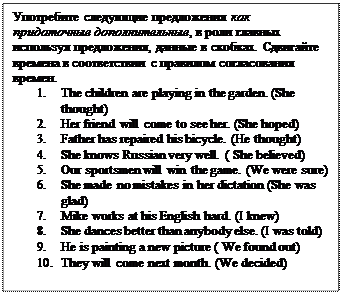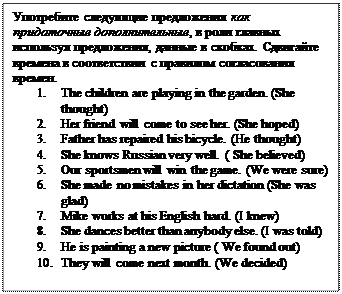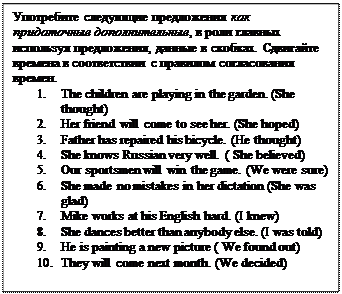
Таблица английских времен в действительном залоге.
|
|
Simple (простое) |
Continuous (длительное) |
Perfect (завершенное) |
Perfect continuous (завершенное длительное) |
||||||
|
|
Факты, обычные, повторяющиеся действия |
Незаконченные действия в определенный момент |
Действия, завершенные к определенному моменту |
Действия, которые длятся в течении какого-то периода времени |
||||||
|
Present (настоящее) |
I (you, we, they) write He (she, it) writes
Does he write? (Often, seldom, usually, sometimes, every week) V 1 (Vs) |
I am writing
You, (we, they) are writing Is she writing? (Now, at the moment)
Be (am/is/are) Ving |
I (you, they) have written He (she, it) has written
Have you written? (already, yet, just, today, this year) Have/has V3 |
I (you, they) have been writing He (she, it) has been writing
Have you been writing? (for a long time, since 5 o’clock)
Have/has been Ving |
||||||
|
Past (прошедшее) |
I wrote (V2) Did you write (V1)? He didn’t write(v1) (Yesterday, long ago, last week) V2=Ved |
I (He, she, it) was writing You, (we, they) were writing Was she writing? (at 5 o’clock yesterday)
Be (was/were) Ving |
I had written
(by 5 o’clock yesterday)
Had V3 |
I had been writing
(for two hours when they came)
Had been Ving |
||||||
|
Future (будущее) |
I, we shall write
I shan’t write He won’t write (tomorrow, soon, some day, next week) Shall/will V1 |
I, we shall be writing
(at this time tomorrow)
Shall be/ will be Ving |
I, we shall have written
(by 5 o’clock tomorrow)
Shall /will have V3 |
I, we shall have been writing
(for two hours when they come)
Shall/will have been Ving |
||||||
|
Future in the Past (Будущее в прошедшее) |
I, we should write He, she, it, you, they would write
Should/would V1 |
I, we should be writing He, she, it, you, they would be writing
Should/would be Ving |
I, we should have written He, she, it, you, they would have written
Should/would have V3 |
I, we should have been writing He, she, it, you, they would have been writing
Should/would have beenV3 |
Согласование времен в контексте косвенной речи.
Present becomes past, past becomes past perfect, future becomes future -in -the- past
|
Now |
Глаголы, которые часто используются
для ввода косвенной речи: to say, to tell, to agree,
to answer that, to find out, to decide, to explain, to think, to reply,
to complain to, to exclaim that, etc. |
||
|
today |
That day |
||
|
tonight |
That night |
||
|
Yesterday |
The day before/the previous day |
||
|
the day before yesterday |
Two days before |
||
|
Ago |
before |
||
|
Last night |
The previous night |
||
|
Tomorrow |
The next day/ the following day |
||
|
The day after tomorrow |
Two days later |
||
|
Here |
there |
||
|
this |
that |
||
|
these |
those |
He said, “I will come tomorrow”. -------- He said (that) he would come the next day.
Если придаточное предложение является вопросом, следует использовать прямой порядок слов; глаголы для передачи вопроса:
to ask, to want to know, to try to find out. Перед общим, альтернативным и разделительным вопросами используется if (whether)
|
He said, “Will you come soon?” |
He asked if I would come soon. |
|
She said, “Does he play tennis or hockey?” |
She wanted to know whether he played tennis or hockey. |
|
I said, “He is a student, isn’t he?” |
I tried to find out if he was a student. |
Если вопрос специальный (wh-question) – использовать местоимения или наречия what, who, how, where, when, etc, и прямой порядок слов: he said, “When did you come?” ----- He asked when I had come.
Просьбы и приказы: The policeman said,” Leave the room at once.” The policeman told everybody to leave the room.
I said,” don’t go home alone.” I advised her not to go home alone.
 Jack said to his father,” I have lost
my notebook.”
Jack said to his father,” I have lost
my notebook.”
 Jack said to his father,” I have lost
my notebook.”
Jack said to his father,” I have lost
my notebook.”
 Jack said to his father,” I have lost
my notebook.”
Jack said to his father,” I have lost
my notebook.”
Материалы на данной страницы взяты из открытых источников либо размещены пользователем в соответствии с договором-офертой сайта. Вы можете сообщить о нарушении.